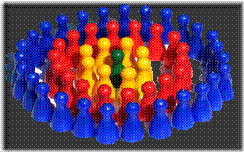Web Visitors to Citizens - The Web Citizen
part 3 of my concept of the transition of web visitor to resident
A citizen is a native or naturalized member of a web entity who has an allegiance to its data and services and is entitled to its protection and privileges.
A citizen should feel less vulnerable (privacy and content protection) and more capable when they elect to become a citizen. They identify with the brand of the web entity they engage with.
Access:
Access can be from the web site or from a partner or customer site. Ideally the citizen can add portal components or gadgets to their preferred or home site.
Expectations:
Applications can be accessed from anywhere, not necessarily at the web entities home page. The citizen expects the same right and privileges that are granted them as if they are on the web entities web site.
From within the web site they expect an open API with the ability to natively embed into common channels such as facebook, myspace, bebo and live spaces.
Behaviour:
The citizen trusts and employs data and services from the web entity and seeks to use this information from another “channel”.
The citizen should also have the right to:
-
- consent (what I allow others to see, view and use)
- manage what applications can share your data and service right
- delegate permission to another citizen
- revoke the permissions at anytime
- reliable functioning services
- understandable accurate and available pricing information
A citizen cannot by its nature be anonymous. A resident is afforded some privileges:
-
- Exclusive access to data and services a resident does not
- Safe guards (e.g. backup)
Technology:
Generic:REST-based API
Microsoft: Live Mesh, Microsoft Silverlight, PopFly, DeepZoom.
Example:
Bank Caja Madrid – Windows Media Center for Online Banking
AT&T – Microsoft Surface being used to pull together product information and purchasing
Rationale
A citizen is an identified user of your data.
One would benefit from providing their residents with citizenship privileges. This will mean that the end user is stickier to the organisation. Encouraging a user to use the web site may be less effective that allowing a user to take components from the site and embed them in their preferred channel. This could not only open the organisation up as a channel for a much larger audience but could so enable partnerships, opportunities for marketing and openings for cross selling.
